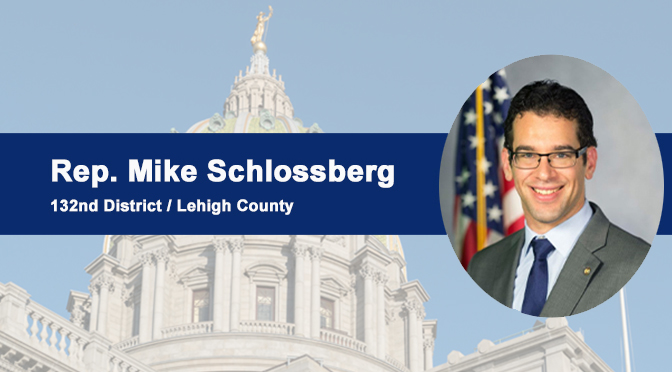|
|
HARRISBURG, June 14 – A $100 million mental health budget proposal that would help Pennsylvanians in all walks of life was discussed today during a Capitol news conference led by state Rep. Mike Schlossberg.
“If we invest $100 million in mental health care in Pennsylvania now, we can save lives and livelihoods. HOPE for PA is a collaborative proposal with input from mental health leaders, stakeholders, and staff. This builds upon existing operations and proposals. It does not replace them.
“With this year’s unprecedented state budget surplus, we have the chance to make a difference. And we should,” said Schlossberg, D-Lehigh, who was joined by legislative colleagues and advocates from the mental health care community.
The plan is dubbed HOPE for PA – Healing, Opportunity, Promise, Excellence in Mental Health Care, and more details can be found here.
The plan would provide:
- $40 million for public safety, creating safe and healthy communities.
- $30 million for provider and capacity shortages, thus improving care.
- $30 million for training, education and outreach, which would help more people.
“Law Enforcement officers are often the first people to interact with members of our community who are in a mental health crisis,” South Whitehall Township Police Chief Glen Dorney said. “HOPE FOR PA will provide the necessary resources for police officers to handle situations appropriately, keep more people out of the criminal justice system, and get them the help they truly need.”
One in five people are currently experiencing a mental health condition, and only half of them are receiving treatment. The COVID-19 pandemic has only plunged Pennsylvania deeper into the already-existing mental health crisis.
“The pandemic did not create the problem, but it added high-octane fuel to a fire already out of control,” said Dr. James A. James III, interim chair of psychiatry and behavioral health at St. Luke’s University Health Network. “The flames of mental illness affect people of all ages but particularly our youth. And as the pandemic, hopefully, runs out of gas and we better adapt to our current world, it is clear that the mental health crisis we face has already too much fuel and is burning far too hot to disappear without intentional action, wise investments and determination.
“Those of us in the fight are outnumbered and under-resourced. Without help the reverberations of this crisis will continue to affect each of us directly or indirectly. I applaud any efforts to find solutions so that we may tamp down this crisis.”
According to the National Alliance on Mental Illness, 39.8% of Pennsylvania adults reported symptoms of anxiety or depression since February 2021 and in 2020. Tragically, 2,014 Pennsylvanians lost their lives to suicide in 2020.
“We have to be honest about the fact that our communities are riddled with trauma and that trauma survivors live with symptoms and behaviors that perpetuate a vicious cycle. Resources and access to quality mental health services is vital in breaking these cycles and creating real change; it’s our only hope,” said Felicia P. Roche, interim director of mental health and social services for New Options, More Opportunities.
Christy Dunbar, an individual living with mental illness and an advocate for NAMI Lehigh Valley, agreed that providing adequate resources is key to a person’s success.
“Because of lack of staffing and bed capacity, in-patient mental health providers can sometimes provide little more than safety, which leaves individuals ill-equipped for success. HOPE for PA would address these issues by providing funding to ensure that individuals being discharged from the hospital receive the support and resources that allow them to regain control over their lives.”







